Following on from yesterday’s post, the curious story surrounding UKIP MEP William Dartmouth and allegations that his land is the site of a proposed wind farm development – in direct contradiction with UKIP policy – has become even more interesting. This is a detailed post.
We have managed to obtain a letter that was sent by Lord Dartmouth’s solicitor to UKIP chairman, Steve Crowther (below).
It states that William Dartmouth does not have any interest in the land where the wind turbines will be sited, rather the land’s ‘proprietor’ is Rosscroft Limited. However Mr Tim Haggie, solicitor at Latimer Hinks, does say that Dartmouth owns land adjacent to the site and that is perhaps why a ‘third party notice’ was served on him. It is interesting to note the address of the local office that Rosscroft Limited uses in the area…
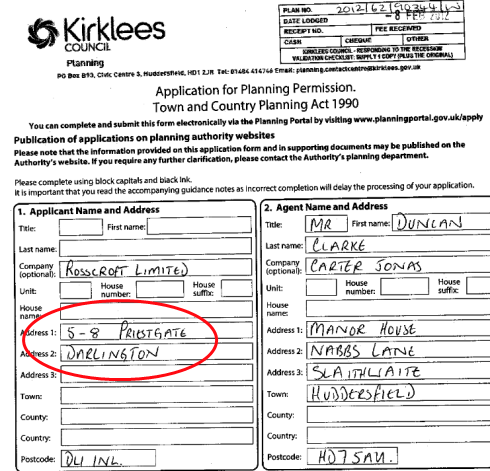
By coincidence it just so happens that another local firm is based at that address…

Backing up Mr Haggie’s assertion about Rosscroft is a document that shows Dartmouth transferred land on Slaithwaite Moor to Rosscroft Limited on 10th February 2011.
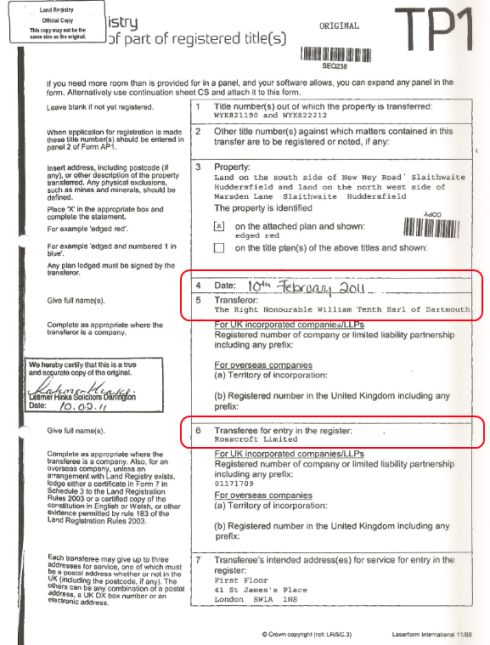
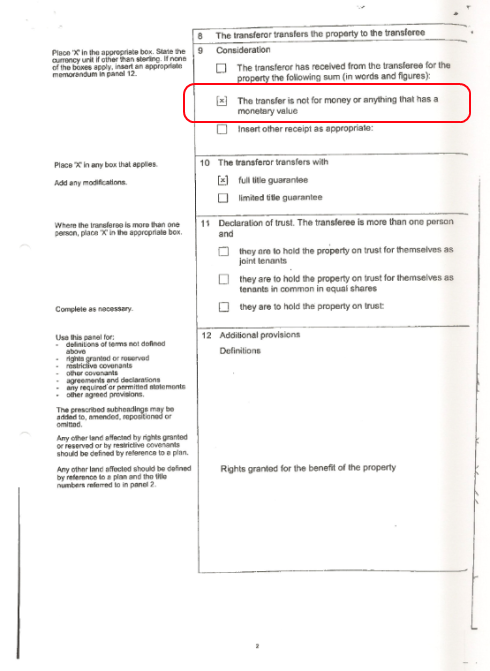
However, Lord Dartmouth must be a very generous fellow because he transferred the land for zero consideration. In other words he gave it away to Rosscroft for nothing. And we are not talking about a plot the size of a domestic garden here, the land in question is shown edged in red and the Cupwith Reservoir is surrounded by a blue box…
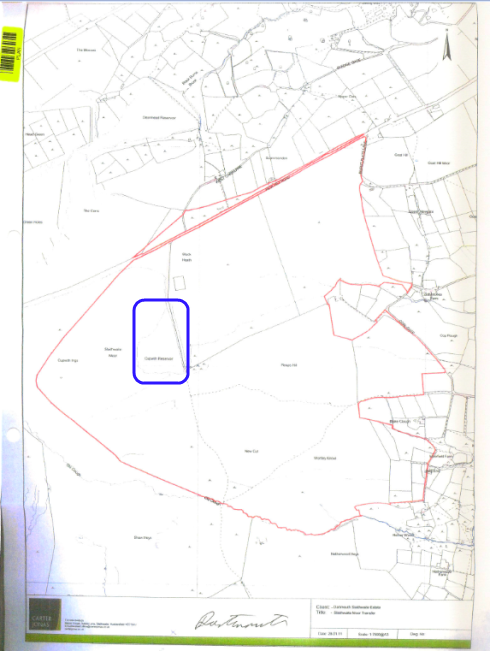
But the situation becomes more confused thanks to a letter from Carter Jonas, Lord Dartmouth’s land agent, in April 2013 to campaigners who were seeking to prevent plans to drain Cupwith Reservoir. As you can see in the circled section, Carter Jonas have been instructed to explain to the recipient of the letter that his comments and remarks in a previous letter regarding the ownership of Slaithwaite Moor by Dartmouth are ‘misconceived’.
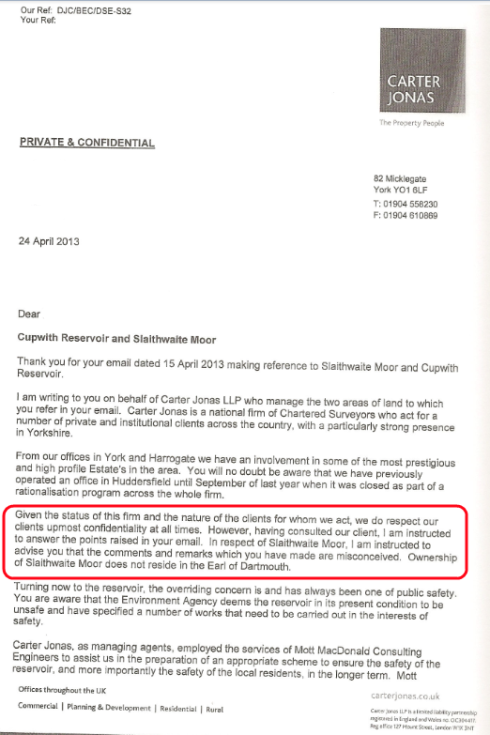
Yet in the same letter, two years after Dartmouth transferred ownership of Slaithwaite to Rosscroft Limited, Carter Jonas make this astonishing comment…
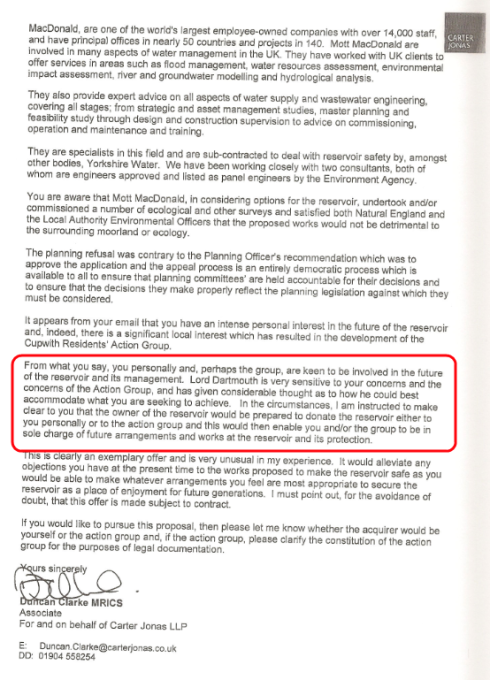
If William Dartmouth had transferred ownership of Slaithwaite Moor two years earlier, and had no direct or indirect interest in the land, why on earth are his land agents saying that Dartmouth is sensitive to the concerns of people who did not want the reservoir drained and has given considerable thought as to ‘how he could best accommodate what you are seeking to achieve’? How can a man with no interest or ownership over the land in question accommodate anything to do with its use or ownership?
We have seen above on the TP1 form that William Dartmouth transferred ownership of Slaithwaite Moor including Cupwith Reservoir in February 2011. The documentary evidence is clear.
As such we have to pose the following question… if Rosscroft Limited became the owner of the land in February 2011, why is it that in August 2011, a memorandum written by consultancy Mott MacDonald asserts the following?
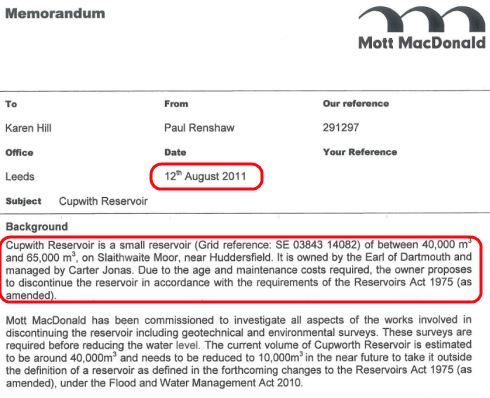
If this is incorrect why was it not corrected either by William Dartmouth or Rosscroft Limited?
Indeed, this takes us back to yesterday’s post and that wind farm planning application. The applicants, Valley Wind Co-operative were duty bound to inform owners of the land on which they wished to develop a wind farm that they were putting in an application. Owners and tenants have to be listed on a form in the application known as an Article 12 Certificate. There are four types, A, B, C and D, neatly explained here.
A Certificate B is completed and submitted when the planning applicant (in this case Valley Wind) know the names of all the owners of the land upon which a planning application is being made. On the wind farm planning application, there is a Certificate B which clearly names Rosscroft Limited and William Dartmouth, both care of Carter Jonas in York, as an owners (or tenants) of the land concerned.
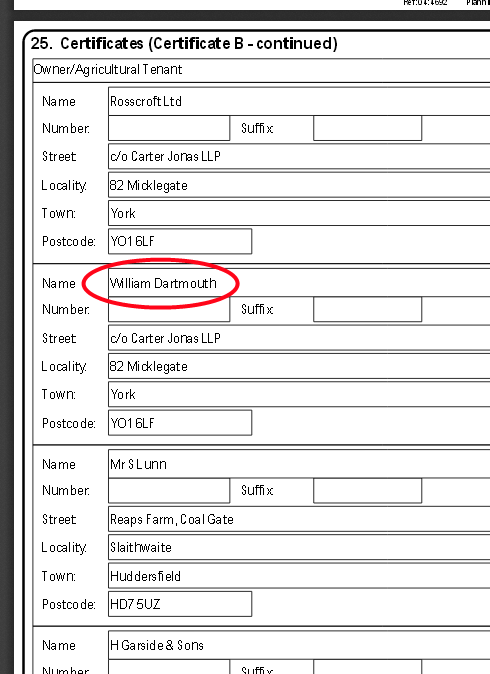
Despite Carter Jonas evidently being made aware that Valley Wind understand William Dartmouth to be an owner of this land, the planning application has not been corrected or amended. Given that such incorrect information is valid reason for a planning application to be rejected, it seems very curious that no correction has been made to what William Dartmouth has said is an error and what his solicitor has said is a third party notice.
We have not yet been able to check with the Huddersfield Daily Examiner if William Dartmouth had requested a correction to their December 2012 story that identifies him as the owner of Cupwith Reservoir, nearly two years after the transfer to Rosscroft Limited. But the stories still make the assertion.
So the question is, why have Carter Jonas and William Dartmouth apparently made no efforts to correct the record which has seen the media and even their paid consultants identify Dartmouth as the land owner at Cupwith Reservoir? It’s an odd one.
We invited UKIP to comment on our story but have not yet received a response.
We also contacted William Dartmouth and invited him to comment on the ownerships and relationships concerning the land in question. He did not want to answer any questions from an anonymous blogger hiding behind a pseudonym and was more concerned in getting a name, however in the end he did email us the following:
But – to be crystal clear – I do not own the land .
So, we know Rosscroft Limited owns the land. But who owns Rosscroft? It seems the directors of the company have been all or mainly ‘paid for’ names on paper only who have directorships in a large number of companies in different fields. But there was a sudden and dramatic change of ownership last year that fitted into an interesting timeline of events.
In February 2013, pre-application advice was sought from Kirkless Council to discuss its views on the proposed wind farm development and whether it would have a possibility of being approved.
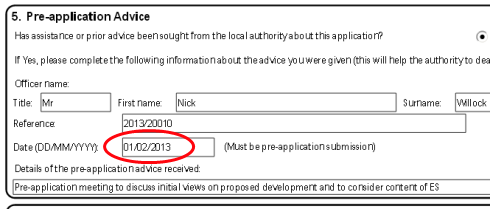
Shortly after that process, without explanation, the long standing directors of Rosscroft Limited were suddenly replaced by a professional director based in Monaco called Ian Frederick Ledger and a company based in the Bahamas called Ambassador Directors Limited. This change means that Rosscroft’s human owners on the other side of the Atlantic cannot be easily identified.
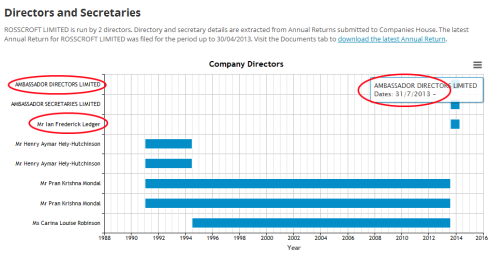
With Rosscroft now enjoying the benefits of offshore privacy, the formal planning application for the wind farm was submitted by Valley Wind.
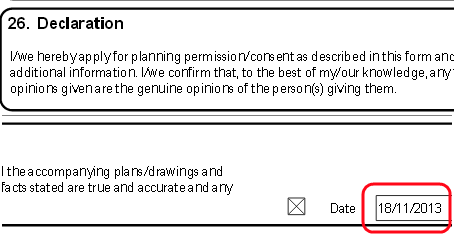
It’s a happy set of coincidences that just by chance seems to have seen Rosscroft adopt a very deep interest in privacy for its beneficial owners – just before it was to become involved in plans for wind turbines on land that we are told was formerly owned by a UKIP MEP, whose party opposes them.
Rosscroft was remarkably fortunate to have been gifted land that within a couple of years would be considered ripe for lavishly rewarding wind turbines; while William Dartmouth seems to have been remarkably fortunate to no longer own land on which an application for wind turbines – against UKIP party policy – was soon to be submitted. And of course there is also the incredible coincidence that both Rosscroft and Dartmouth share the same solicitors and agents! It’s a small world.
Curious people will no doubt be asking questions about all this. Here are some that need to be answered:
- Given these series of events, do William Dartmouth or the Dartmouth family have any financial interest or share ownership in Rosscroft Limited?
- Has William Dartmouth ever created a bare or discretionary trust where the trust property includes all or part of Rosscroft Limited, or any of the land transferred to Rosscroft Limited?
- Why have neither Carter Jonas nor William Dartmouth immediately corrected what must be an inaccurate planning application, especially when his solicitor said as long ago as January that the Dartmouth has no interest in the land he is listed on Certificate B as owning?
- Why did neither Carter Jonas nor William Dartmouth immediately correct the Mott MacDonald memo and report stating the Earl of Dartmouth is the owner of the land well after the transfer date?
- Why have local media stories citing William Dartmouth as the owner of land he transferred to Rosscroft not been corrected?
- If William Dartmouth, despite not being the owner of Cupwith Reservior and having no direct or indirect interest in it, was influential enough to bring about an offer by its owner to give away the reservoir to campaigners who did not want it drained, does he not have the same influence to prevent the wind turbines being constructed on the same land?
- As a UKIP MEP and stated adjacent land owner, with apparent influence and concern in the local neighbourhood, will William Dartmouth be submitting a formal objection to the wind farm planning application?
- Will William Dartmouth or his solicitor make available the ‘third party notice’ he is said to have received in respect of being an adjacent land owner to the application site?
- Does William Dartmouth or his family have any direct or indirect interest or share ownership in Ambassador Directors Ltd?
- Is UKIP’s William Dartmouth MEP using an offshore company to conceal involvement in a wind turbine development?
 This is another of those compare and contrast moments that so annoy UKIP supporters who read this blog, but which are covered here because UKIP ignoring such major issues annoys me so much.
This is another of those compare and contrast moments that so annoy UKIP supporters who read this blog, but which are covered here because UKIP ignoring such major issues annoys me so much.

 The EU policy at work poster is plays on the anxieties of low and semi skilled workers, portraying a man in a hard hat who made to appear as though he has been adversely affected by cheap labour coming to this country from other EU countries. The problem with this is that only certain sectors have been affected and the impact has not been across the board.
The EU policy at work poster is plays on the anxieties of low and semi skilled workers, portraying a man in a hard hat who made to appear as though he has been adversely affected by cheap labour coming to this country from other EU countries. The problem with this is that only certain sectors have been affected and the impact has not been across the board. Then there is the casual ignorance of highly skilled roles that could not be filled, such as dentists, which now have been thanks to labour from EU member states, to the benefit of large numbers of patients. Indeed my own excellent dentist is from Lithuania and prior to dentists from other EU countries coming to my town, getting NHS dentistry was all but impossible. Are UKIP suggesting this is a bad thing? It is but one example, but there are others where this country’s less well off most certainly benefit.
Then there is the casual ignorance of highly skilled roles that could not be filled, such as dentists, which now have been thanks to labour from EU member states, to the benefit of large numbers of patients. Indeed my own excellent dentist is from Lithuania and prior to dentists from other EU countries coming to my town, getting NHS dentistry was all but impossible. Are UKIP suggesting this is a bad thing? It is but one example, but there are others where this country’s less well off most certainly benefit. Then there is the bus/limo poster. At first glance it’s clever, but there is an element of rank hypocrisy here because our daily grind is also funding the very comfortable lifestyles of UKIP’s MEPs. UKIP separating themselves from the gravy train when they have first class seats on it is basically dishonest.
Then there is the bus/limo poster. At first glance it’s clever, but there is an element of rank hypocrisy here because our daily grind is also funding the very comfortable lifestyles of UKIP’s MEPs. UKIP separating themselves from the gravy train when they have first class seats on it is basically dishonest.

 What is clear from the Survation poll of the Eastleigh constituency, commissioned by UKIP’s Alan Bown, is that local factors are at play in Eastleigh that are seeing UKIP maintain strong support compared to nationwide polling.
What is clear from the Survation poll of the Eastleigh constituency, commissioned by UKIP’s Alan Bown, is that local factors are at play in Eastleigh that are seeing UKIP maintain strong support compared to nationwide polling.
 The only surprise is that it took this long. The
The only surprise is that it took this long. The 














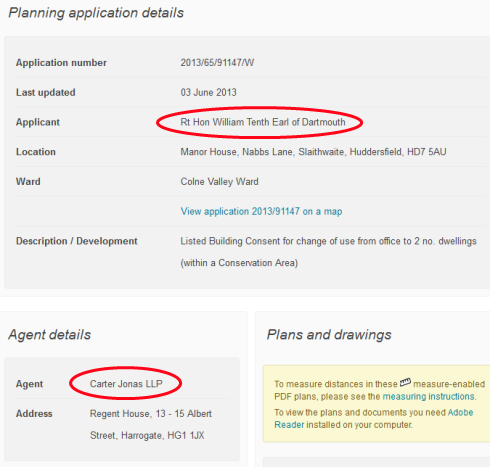
 Met Office forecasts are seemingly becoming ever more sensationalist. Observed weather conditions too often show that predicted extreme weather either fails to materialise, or turns out to be nowhere near as extreme as forecast.
Met Office forecasts are seemingly becoming ever more sensationalist. Observed weather conditions too often show that predicted extreme weather either fails to materialise, or turns out to be nowhere near as extreme as forecast.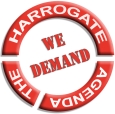

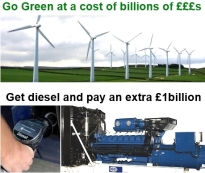





What’s on your Mind?